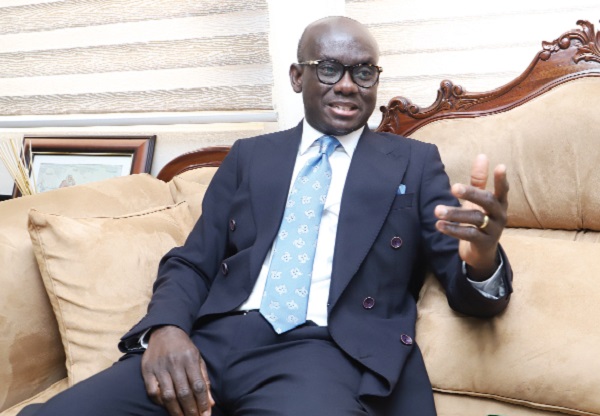
Ghana is committed to safeguarding the human rights and freedoms of all persons and, thus, prohibits all forms of violence against all persons, the Attorney-General (A-G) and Minister of Justice, Godfred Yeboah Dame, has said.
According to him, the state did not allow or support indignity and harm to persons, including minority groups, the vulnerable and even those serving punishment imposed by law.
Ghana is committed to respecting and protecting human rights and freedoms of all persons, the state is committed to the protection of all persons from all forms of brutality targeted at any group of persons including all minority groups.
All crimes of violence when reported are effectively investigated by the necessary authorities and perpetrators are brought to justice,” he intimated.
Dame was speaking on the state of human rights in Ghana at the 42nd Session of the Universal Periodic Review (UPR) held at the United Nations Human Rights Council Headquarters in Geneva, last Tuesday.
The Universal Periodic Review (UPR) is a process through which all United Nations (UN) member states are provided the opportunity to review the human rights records of all other member states.
Ghana, a member of the UN, has been part of the UPR since its introduction in 2006 under the resolution that established the UN Human Rights Council, with the responsibility of promoting universal respect for the protection of all human rights and fundamental freedoms.
Ghana’s first, second and third UPR reviews took place in May 2008, October 2012 and November 2017, respectively, with the current one being the fourth review.
The A-G led Ghana’s delegation, made up of the First Deputy Speaker of Parliament, Joseph Osei-Owusu; the Solicitor-General, Helen Akpene Awo Ziwu; the Commissioner of the Commission on Human Rights and Administrative Justice (CHRAJ), Joseph Whittal, and other government officials to attend the UPR which was also broadcast virtually via a webcast.
Also present for Ghana’s review was a group of civil society organisations (CSOs) led by the POS Foundation and its Executive Director, Jonathan Osei Owusu, the convenor of the CSOs action group on the UPR.
The documents on which Ghana’s human rights review was done were national reports through information provided by the State under review, information contained in the reports of independent human rights experts and groups, known as the Special Procedures; human rights treaty bodies and other UN entities, as well as information provided by other stakeholders, including national human rights institutions, regional organisations and CSOs.
On the issue of actions or measures taken to address discrimination against minority groups such as women, children and the lesbian, gay, bisexual, transgender, queer or questioning, intersex, asexual (LGBTQIA+) community, the A-G said the state did not support any actions that negatively impacted minority groups or those of different sexual orientation.
He made reference to the Promotion of Proper Human Sexual Rights and Ghanaian Family Values Bill which is meant to curtail homosexual activities.
The state does not lend its support to any person or organisation that advocates or inflicts harm on all persons, including minority groups and those of different sexual orientation.
“The government, through the Attorney-General, has stated its position on the Promotion of Proper Human Sexual Rights and Ghanaian Family Values Bill 2021 currently before Parliament which is to ensure that the bill is in compliance with the provision of the constitution of Ghana particularly chapter five of human rights and fundamental freedom,” he noted.
Corruption
Dame said Ghana had put in measures to deal with corruption which inhibited the achievement of the sustainable development goal on eradication of poverty, a key indicator for the promotion of human rights.
Since 2017 the Government of Ghana has put in efforts to combat corruption, through establishment of the Office of the Special Prosecutor to investigate and prosecute bribery and related criminal cases and the passing of the Witness Protection Act which is to protect persons who assist law enforcement agencies by disclosing information,” he noted.
Civil and political rights
Additionally, the A-G said the country was committed to promoting the civil and political rights of persons as stipulated by the laws of the country.
For instance, the government has put in place measures to curtail issues of law enforcement officers taking the law into their hands to brutalise people and abuse their rights
They are trained not to engage in an act of torture on the conduct of arrest, investigation and interrogation. Acts of excessive use of force by police officers are thoroughly investigated and disciplinary measures duly instituted,” he said.
Economic, social, cultural rights.
The A-G added that Ghana had also put in place the legal regime as well as practicable measures to promote the economic, educational, cultural and social rights of people.
“The Constitution provides for all persons to have access to education and to realise this, basic education shall be free in Ghana and there is the progressive introduction of free education at the secondary level.
“There is also the Back-to-School Campaign which aims at ensuring that children including pregnant schoolgirls and persons with disabilities have access to education. Ghana Accountability Learning Project aims to improve the quality of education in low performing basic education school.” he noted.
Health
In the area of health, the A-G noted that initiatives introduced by the government were geared towards access to quality health care for all.
We have the Agenda 111 which is to build 111 hospitals across the country to improve healthcare services. There are also drones for delivery of emergency health commodities and blood to hospitals and healthcare facilities in remote areas.

